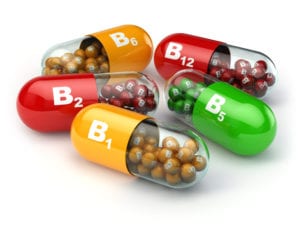Written by Jessica Patella, ND. This study demonstrates that higher intake of vitamin B6 could help relieve moderate-to-severe depressive symptoms in Japanese middle-aged and elderly women.
 According to the World Health Organization the number of people globally with anxiety or depression has increased to 550 million 1. Women are more at risk of mental disorders than men, due to large fluctuations in hormone levels, this is particularly observed with menopause and the loss of estrogen 2-5. In the United States an estimated 1.3 million women reach menopause each year, with about 20% of those experiencing depression 6. A recent study investigated the link between depression in women over 40 years of age and how it may relate to nutrient intake in the diet 2.
According to the World Health Organization the number of people globally with anxiety or depression has increased to 550 million 1. Women are more at risk of mental disorders than men, due to large fluctuations in hormone levels, this is particularly observed with menopause and the loss of estrogen 2-5. In the United States an estimated 1.3 million women reach menopause each year, with about 20% of those experiencing depression 6. A recent study investigated the link between depression in women over 40 years of age and how it may relate to nutrient intake in the diet 2.
Growing research is suggesting a relationship between B vitamins (folate, B1, B6, B12), zinc, and iron and mental health 2,7,8. Folate deficiency has been associated with depression in elderly patients 7, while some double-blind studies have found thiamine (B1) was associated with improved mood 7. More specifically to women, iron deficiency anemia, is associated with apathy, depression and fatigue while exercising 7, yet very little research has been conducted with peri- and post-menopausal women. Therefore, researchers investigated the effects of nutrients from the diet and depression and anxiety in women in the peri-menopause to post-menopause age range 2.
The research included 289 women 40 years and older (mean age= 52.0+/-6.9 year) with anxiety and depression (Hospital Anxiety and Depression Scale, HADS). Dietary consumption of nutrients was assessed using a diet history questionnaire. Anxiety and Depression, based on the HADS, were divided into mild (0-7 point), moderate (8-10 points), severe (11-21 points).
Women that fell in the moderate-to-severe categories were analyzed for dietary intake of 43 major nutrients, based on the food questionnaire data obtained from each woman. The only nutrient that was found to be inversely associated with depressive symptoms was vitamin B6 (AOR=0.89, 95%CI=0.80-0.99).
Vitamin B 6 (pyridoxal 5’-phosphate) serves as an enzymatic cofactor in more than 140 biochemical reactions in the body, including heme biosynthesis, fatty acid metabolism, glycogen breakdown and with neurotransmitters 2,9. The synthesis of serotonin (a known neurotransmitter involved with mood and depression) from tryptophan is dependent on vitamin B6 for the biosynthesis to occur. Therefore, researchers suggested it is possible that vitamin B6 deficiency may play a role with depression through this mechanism of action 2.
In conclusion, depressive symptoms may be improved with a higher intake of vitamin B6. Future research would need to supplement vitamin B6 in those suffering with anxiety and/or depression. It is important to note this study is correlational, an experimentally designed study is the next step to confirm results and to determine optimal dosing.
Source: Odai, Tamami, et al. “Depressive Symptoms in Middle-Aged and Elderly Women Are Associated with a Low Intake of Vitamin B6: A Cross-Sectional Study.” Nutrients 12.11 (2020): 3437.
© 2020 by the authors. Licensee MDPI, Basel, Switzerland. This article is an open access article distributed under the terms and conditions of the Creative Commons Attribution (CC BY) license (http://creativecommons.org/licenses/by/4.0/)
Click here to read the full text study.
Posted March 2, 2021.
References:
- World Health Organization. WHO. Depression and other common mental disorders: global health estimates. World Health Organization;2017.
- Odai T, Terauchi M, Suzuki R, Kato K, Hirose A, Miyasaka N. Depressive Symptoms in Middle-Aged and Elderly Women Are Associated with a Low Intake of Vitamin B6: A Cross-Sectional Study. Nutrients. 2020;12(11).
- Ryan J, Burger HG, Szoeke C, et al. A prospective study of the association between endogenous hormones and depressive symptoms in postmenopausal women. Menopause. 2009;16(3):509-517.
- Vivian-Taylor J, Hickey M. Menopause and depression: is there a link? Maturitas. 2014;79(2):142-146.
- Georgakis MK, Thomopoulos TP, Diamantaras AA, et al. Association of Age at Menopause and Duration of Reproductive Period With Depression After Menopause: A Systematic Review and Meta-analysis. JAMA Psychiatry. 2016;73(2):139-149.
- Bhatt N. What is the prevalence of depression in menopause? . 2019; https://www.medscape.com/answers/295382-172975/what-is-the-prevalence-of-depression-in-menopause#:~:text=Although%20most%20women%20transition%20to,in%20risk%20during%20postmenopausal%20years. Accessed February 22, 2021.
- Benton D, Donohoe RT. The effects of nutrients on mood. Public Health Nutr. 1999;2(3a):403-409.
- LaChance LR, Ramsey D. Antidepressant foods: An evidence-based nutrient profiling system for depression. World J Psychiatry. 2018;8(3):97-104.
- Parra M, Stahl S, Hellmann H. Vitamin B₆ and Its Role in Cell Metabolism and Physiology. Cells. 2018;7(7).

